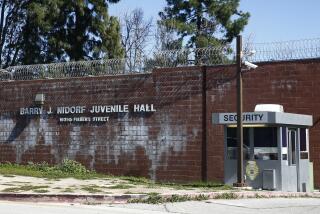O.C. Jails, Debt Get Bulk of Windfall
- Share via
Despite pleas to spend more of the windfall on health care, the Board of Supervisors voted Tuesday to use most of the $912 million Orange County will receive from the national tobacco settlement to build more jail beds and reduce debts.
Orange County is the only jurisdiction in Southern California not to use a large chunk of the tobacco settlement for health and social-services programs--a fact that has been harshly criticized by those who say such services have been neglected in the years following the 1994 bankruptcy.
For the record:
12:00 a.m. Nov. 12, 1999 For the Record
Los Angeles Times Friday November 12, 1999 Orange County Edition Metro Part B Page 3 Metro Desk 1 inches; 35 words Type of Material: Correction
Tobacco settlement--A story Wednesday about Orange County’s $912-million tobacco settlement misstated the amount some county officials want to allocate for health care services. The amount is $7 million a year for 25 years, which is 19% of the total.
But supervisors maintained Tuesday that most of the money should go to what they have long considered their two biggest priorities: cutting debt incurred during the financial collapse and reducing jail overcrowding.
The plan calls for the early repayment of debts that officials said would save the county $110 million in interest payments over 10 years.
“I can’t walk away from that,” said Supervisor Todd Spitzer. “I can’t walk away from the substantial amount of savings that we have the opportunity to reap for this county if we are very diligent and work in an appropriate manner to make sure that we retire this debt.”
Added Supervisor Jim Silva: “We have an obligation to pay that bankruptcy debt off. We’re looking down the barrel of the bankruptcy.”
In a concession to critics, however, supervisors instructed county officials to meet with health-care advocates over the next four months and come up with a plan to spend an undetermined share of the tobacco settlement on health care. County staffers had originally proposed spending $7 million--less than 1% of the total--on such services. But supervisors deleted that amount and indicated they might be willing to spend more.
Some advocates for the poor expressed disappointment at the board’s action, saying it’s misguided to focus on expanding jails at the expense of providing better health care services.
“Those of us in health care have a suspicion that [jail inmates] are committing crimes in order to go to jail and get treatment,” said Jean Forbath, a founder of Share Our Selves, an organization providing meals, medical services and low-income housing in Costa Mesa. “They have better health care in the jail than outside.”
Forbath said after the meeting that she hopes supervisors understand that the $7 million originally proposed for health care simply isn’t enough to meet the needs. She pointed out that county health officials haven’t even figured out how much money they could use to expand programs.
“Take community clinics, for example. How much is it going to cost to bring in medical specialists? Or to expand hours?” she said.
Others, however, said they left the meeting hopeful that the supervisors will eventually help their causes. “This was a good outcome for us. We’re satisfied,” said Jon Gilwee, a member of the coalition, called Health Alliance to Reinvest the Tobacco Settlement.
What to do with the settlement from the tobacco industry has been an emotional topic for months. Local health care providers said it’s unfair for the county to use money gained because of a major public health crisis for other purposes.
L.A. Agencies Spend on Health
Neighboring government agencies have agreed to use the lion’s share of the windfall for health-related items. Los Angeles County, which will receive a total of $3.4 billion, is planning to replace County-USC Medical Center, while the city of Los Angeles will spend most of its tobacco settlement on health needs, including anti-smoking education programs and wheelchair curb cuts to aid the disabled.
A poll of 505 Orange County residents conducted by the Health Alliance to Reinvest the Tobacco Settlement found that 82% of respondents wanted tobacco settlement money to go to health-related needs.
State Sen. Joe Dunn (D-Santa Ana) cited the poll Tuesday in urging supervisors to use the bulk of the settlement for health care. “Those are dramatic numbers,” he said.
Supervisors on Tuesday asked health-care advocates to work with county officials to draw up a list of priorities and their costs.
The board also authorized the county financial officer to leverage part of the tobacco settlement through a nonprofit agency. The agency would sell bonds tied to the settlement and use the proceeds to help pay for jail expansion and reduce part of the bankruptcy debt.
County Chief Financial Officer Gary Burton told supervisors the jails are operating under a 21-year-old federal court order that held the county in contempt because of overcrowding at its jails. The situation results in the early release of thousands of inmates a year before their sentences are up.
“Right now there is an immediate need for 2,532 jail beds,” Burton said.
The county plan calls for construction of a 500-bed drug and alcohol rehabilitation facility and another 576-bed expansion, possibly at Theo Lacy Branch Jail in Orange at a cost of about $175 million.
The Deputies Assn. of Orange County joined with county officials in support of jail construction.
“Keeping criminals in jail so that they don’t recommit crimes and victimize people is a health issue,” said Sheriff’s Sgt. Wayne Quint Jr., the organization’s president.
More to Read
Sign up for Essential California
The most important California stories and recommendations in your inbox every morning.
You may occasionally receive promotional content from the Los Angeles Times.









